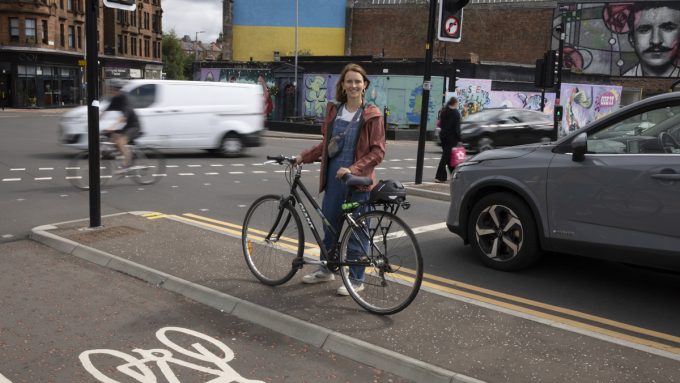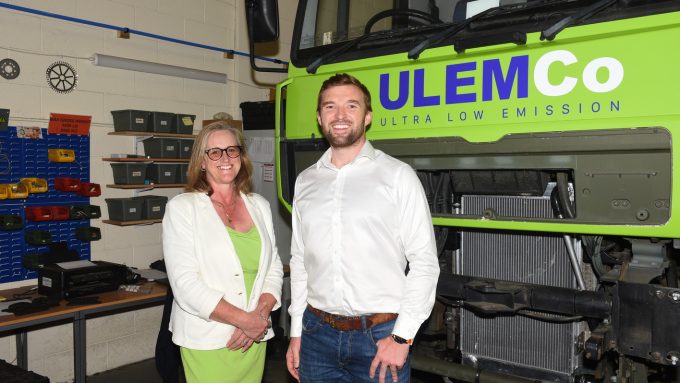
Dragon investment and Catapult support help drive car charging innovation

Entrepreneur Michael Goulden and business partner Ben Whitaker walked away from hit TV show Dragons’ Den with £50,000 of investment from businessperson Deborah Meaden in an episode broadcast last month.
The pair presented their innovation Kerbo Charge, which allows owners of electric cars to recharge their vehicles safely in the street outside their homes, without trailing cables causing a trip hazard on the footway.

Kerbo Charge is a durable and shallow channel inserted in the pavement, into which a charging cable is placed before it is hidden by a self-closing lid. Upon completion of a charge, the cable is removed.
The product was first trialled last year at six locations in Milton Keynes as part of an Accelerator programme in the town delivered by Connected Places Catapult, and has since been rolled out to around 100 sites across nine local authority areas in England.
“We are delighted to have such a high-profile investor on board,” says Michael of Deborah Meaden, who agreed to invest in the business for a 6% stake. “We are currently finalising the investment agreement, and since the episode was filmed we’ve launched trials with a further eight local authorities.”
He adds that the Milton Keynes Accelerator “played a major part in our ability to progress as a company” because “it can be hard for a council to agree to be the first to try out a new product”.
Michael continues: “The Accelerator was the perfect programme, because it gave us advice when we needed it, and helped us to partner with industry and build networks with fellow members of the cohort.”
An idea borne out of frustration
The idea for Kerbo Charge came to Michael, a former management consultant, three years ago when living in north east London in a terraced house without a driveway. “I became frustrated by the cost and inconvenience of having to use a public charge point to recharge our electric car, and thought there must be a better way.”
Recharging a vehicle at home can be up to £25 cheaper than using a public charger, he claims, representing an average annual saving of £1500. But trailing a charging cable out of your front door and across the footway could make the pavement unsafe for pedestrians and those using wheelchairs or pushchairs – and potentially leave owners liable for prosecution in the event of an injury.
There are other ways in which electric vehicles can be charged in the street; from rising bollards that pop out of the footway, to the conversion of lamp posts to electric vehicle chargers. But Michael is not convinced by these alternatives. “It doesn’t really matter how many lamp posts you convert; in my view you still won’t get large scale adoption of electric vehicles in cities because charging that way will be more expensive.
“Forty percent of UK motorists don’t have a private driveway, and there is little economic incentive for more drivers to move away from petrol or diesel cars to electric unless they can charge safely and more cheaply than using public charge points.”
Kerbo Charge’s footway channel is only 40mm wide, 30mm deep and is designed to blend in with the pavement. It is made from durable plastic of the sort used for decades on street furniture, and has the self-closing lid so that the channel cannot be left open. “We have tested our product in a laboratory to 70 years of equivalent use without any issues,” Michael adds.

Meeting the needs of everyone
Kerbo Charge has been in discussion with the accessibility charity Motability to ensure the design of the charging channel meets the needs of physically impaired users, and is keen to work with other disability groups to build more awareness of the potential danger of trailing cables on footways.
Longer term, Michael says the company aims to start rolling out what he describes as a “hyper-local national sharing network” where neighbours club together to share the cost of installing a charging channel outside their homes, and arrange their charging slots using a smartphone app, so more people can benefit from cheaper charging outside their homes.
“I want to see many more people use electric vehicles; it is the fastest way that we can reduce air pollution and cut the number of people dying prematurely from asthma and dementia,” he adds. “But many people in the UK think an electric vehicle is not for them because they don’t have a driveway. I hope this product will help more of them to think otherwise.”





